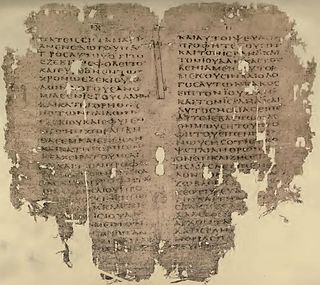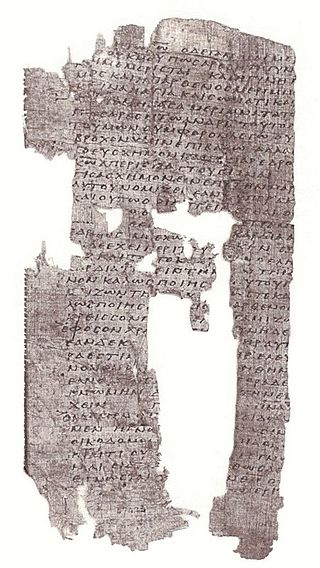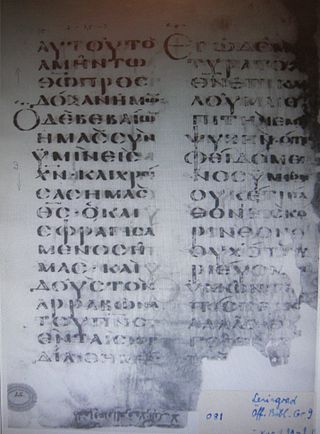
Acts 2 is the second chapter of the Acts of the Apostles in the New Testament of the Christian Bible. The book containing this chapter is anonymous but early Christian tradition asserted that Luke composed this book as well as the Gospel of Luke. This chapter records the events on the day of Pentecost, about 10 days after the ascension of Jesus Christ.
Acts 20 is the twentieth chapter of the Acts of the Apostles in the Christian New Testament of the Bible. It records the third missionary journey of Paul the Apostle. The narrator and his companions ("we") play an active part in the developments in this chapter. The book containing this chapter is anonymous, but early Christian tradition uniformly affirmed that Luke the Evangelist composed this book as well as the Gospel of Luke.

Acts 26 is the twenty-sixth chapter of the Acts of the Apostles in the New Testament of the Christian Bible. It records the period of Paul's imprisonment in Caesarea. The book containing this chapter is anonymous, but Holman states that "uniform Christian tradition affirms that Luke wrote both" this book as well as the Gospel of Luke, as supported by Guthrie based on external evidence.

Romans 12 is the twelfth chapter of the Epistle to the Romans in the New Testament of the Christian Bible. It is authored by Paul the Apostle, while he was in Corinth in the mid-50s AD, with the help of an amanuensis (secretary), Tertius, who adds his own greeting in Romans 16:22.

1 Corinthians 5 is the fifth chapter of the First Epistle to the Corinthians in the New Testament of the Christian Bible. It is authored by Paul the Apostle and Sosthenes in Ephesus. In this short chapter, Paul demonstrates the festivals of Christianity.

1 Corinthians 10 is the tenth chapter of the First Epistle to the Corinthians in the New Testament of the Christian Bible. It is authored by Paul the Apostle and Sosthenes in Ephesus. In this chapter Paul writes about the Corinthians' Exodus journey and the Eucharist, and returns to the subject of food offered to idols. The argument concerning meats offered to idols is resumed in 1 Corinthians 10:14.

2 Corinthians 1 is the first chapter of the Second Epistle to the Corinthians in the New Testament of the Christian Bible. It is authored by Paul the Apostle and Timothy in Macedonia in 55–56 CE.

2 Corinthians 2 is the second chapter of the Second Epistle to the Corinthians in the New Testament of the Christian Bible. It is authored by Paul the Apostle and Timothy in Macedonia in 55–56 CE.

2 Corinthians 13 is the thirteenth and final chapter of the Second Epistle to the Corinthians in the New Testament of the Christian Bible. It is authored by Paul the Apostle and Timothy in Macedonia in 55–56 CE.

Galatians 1 is the first chapter of the Epistle to the Galatians in the New Testament of the Christian Bible. It is authored by Paul the Apostle for the churches in Galatia, written between 49 and 58 AD. This chapter contains Paul's significant exposition concerning the significance of God's revelation of Jesus Christ.

Ephesians 1 is the first chapter of the Epistle to the Ephesians in the New Testament of the Christian Bible. Traditionally, it is believed to have been written by Apostle Paul while he was in prison in Rome, but more recently, it has been suggested that it was written between AD 80 and 100 by another writer using Paul's name and style. This chapter contains the greeting, followed by a section about "The Blessing of God" and Paul's prayer.

Ephesians 2 is the second chapter of the Epistle to the Ephesians in the New Testament of the Christian Bible. Traditionally, it is believed to have been written by Apostle Paul while he was in prison in Rome, but more recently it has been suggested that it was written between AD 80 and 100 by another writer using Paul's name and style.

Ephesians 3 is the third chapter of the Epistle to the Ephesians in the New Testament of the Christian Bible. Traditionally, it is believed to have been written by Apostle Paul while he was in prison in Rome, but more recently it has been suggested that it was written between AD 80 and 100 by another writer using Paul's name and style. This chapter is part of a long prayer of Paul, with the particular section about Paul's stewardship of the great divine mystery, the petition for Christ to dwell in the believers' heart, and a doxology.

Ephesians 4 is the fourth chapter of the Epistle to the Ephesians in the New Testament of the Christian Bible. Traditionally, it is believed to have been written by Apostle Paul while he was in prison in Rome, but more recently, it has been suggested that it was written between AD 80 and 100 by another writer using Paul's name and style. This chapter is a part of Paul's exhortation, with the particular section about the mutual interdependence of the Christians as the church and how they should live in the world (4:17–5:20).

Ephesians 5 is the fifth chapter of the Epistle to the Ephesians in the New Testament of the Christian Bible. Traditionally, it is believed to be written by Apostle Paul while he was in prison in Rome. More recently, it is suggested to be written between AD 80 and 100 by another writer using Paul's name and style, however this theory is not widely accepted. This chapter is a part of Paul's exhortation, with the particular section about how Christians should live in the world (4:17–5:20) and in their responsibilities as households (5:21–6:9).

1 Timothy 2 is the second chapter of the First Epistle to Timothy in the New Testament of the Christian Bible. The author has been traditionally identified as Paul the Apostle since as early as AD 180, although most modern scholars consider the letter pseudepigraphical, perhaps written as late as the first half of the second century AD.

1 Timothy 5 is the fifth chapter of the First Epistle to Timothy in the New Testament of the Christian Bible. The author has been traditionally identified as Paul the Apostle since as early as AD 180, although most modern scholars consider the letter pseudepigraphical, perhaps written as late as the first half of the second century AD.

Philippians 1 is the first chapter of the Epistle to the Philippians in the New Testament of the Christian Bible. It is authored by Paul the Apostle about mid-50s to early 60s AD and addressed to the Christians in Philippi, written either in Rome or Ephesus. This chapter contains the greeting, thanksgiving, prayer and exhortation as an introduction (overture) to the major narratives in the next chapters.

Titus 2 is the second chapter of the Epistle to Titus in the New Testament of the Christian Bible. The letter is traditionally attributed to Paul the Apostle, sent from Nicopolis of Macedonia, addressed to Titus in Crete. Some scholars argue that it is the work of an anonymous follower, written after Paul's death in the first century AD. This chapter describes the qualities of members of the community and doctrinal statements regarding the death of Christ in relation to the removal of sin.

Titus 3 is the third and final chapter of the Epistle to Titus in the New Testament of the Christian Bible. The letter is traditionally attributed to Paul the Apostle, sent from Nicopolis of Macedonia, addressed to Titus in Crete. Some scholars argue that it is the work of an anonymous follower, written after Paul's death in the first century AD. This chapter contains the author's instruction for the church as a community with responsibilities in the public realm, towards the government and also towards individuals, concluded with some personal requests for Titus before the final benediction.













